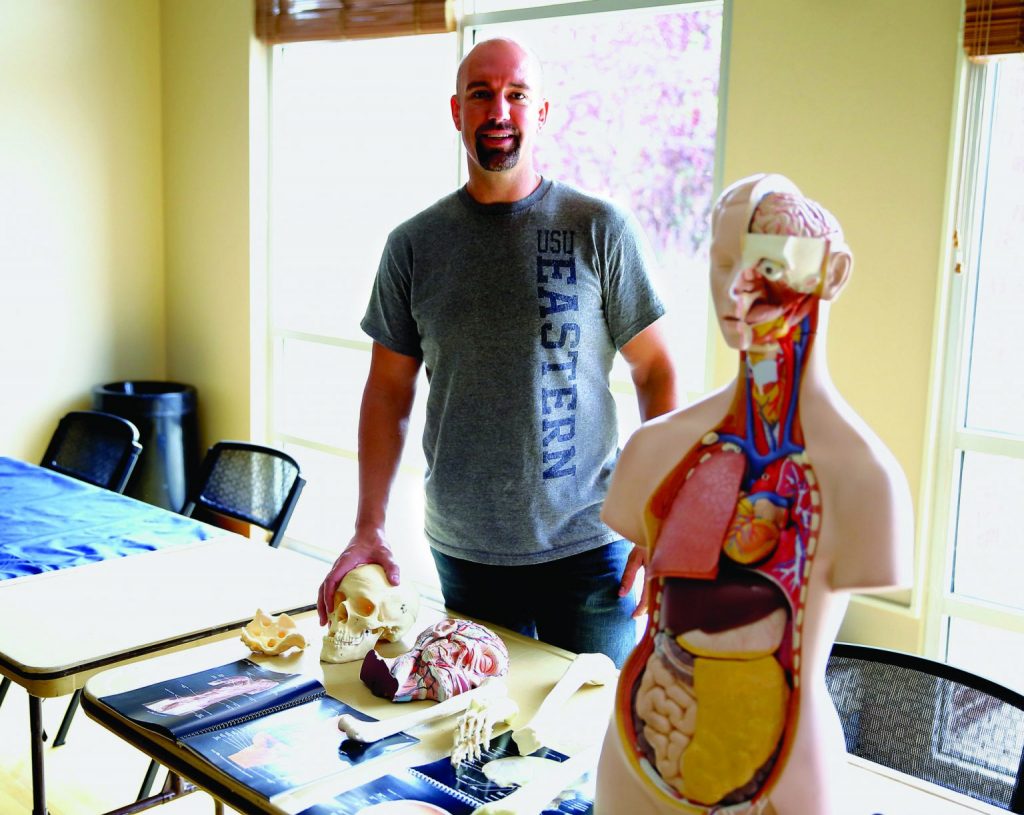Chappell receives outstanding faculty of the year award

This archived article was written by:
A professor who takes his wife on what he calls “cadaver dates” was named USU Eastern’s professor of the year recently.
Tyson Chappell, Ph.D., joined the faculty five years ago to instruct the biology classes. He specialized in studying the brain while working on his doctorate at the University of Tennessee, however when he arrived on campus, he knew his anatomy classes needed to work on a human body to understand the concepts he was teaching. Dissecting frogs and animal hearts did not prepare the students for human anatomy, he said.
Where does one find a cadaver to rent? He searched the Internet and found that the University of Utah medical school had cadavers for rent. He completed the paperwork to secure the cadaver for USU Eastern, then asked his wife, Amber, to go on a date with him where they would pick up the cadaver in Salt Lake City and stop for dinner on the way home.
He started with one male cadaver in his program and has since added a female cadaver. He keeps them a year and rotates each one for another one. He returns the cadaver to the U of U, where the body is cremated, placed in an urn and buried. “The rent mostly covers the cost of taking care of the body for its loved ones,” he said.
When he gets the cadaver body, he has to cut the skin from the muscles. He usually does this on the head and torso. “Students need to see what the muscles look like as they relate to the skeleton,” he said. “They need to see first hand how the organs fit together and they need to see what the brain looks like.”
Seeing the cadavers for the first time has not set well with some of his students. “I have students pass out and get nauseous when they see the bodies. The cadavers are all preserved in formaldehyde before I pick them up so the only smell is from the preservative.” He has to spray the cadaver with a chemical to continue to keep it preserved.
Chappell was raised in Loa, Utah, and when he was a junior in college at Weber State University, he decided to major in psychology. “I fell in love with the study of the brain and took every bio-abnormal psychology and neuroscience class I could.
After graduation, he was accepted into a doctorate program at the University of Tennessee where he continued to study neuroscience and anatomy.
His love of photography came when he purchased a three-megapixel camera to take photos of his daughter. At the same time, he was taking video imaging of the brain. “It was a perfect time in my life to get into photography because shooting digital was inexpensive compared to buying and developing rolls of film.” He paid for graduate school by taking photos of weddings and family shots.
He continues to upgrade his cameras and equipment. “I love to shoot night shots . . . the Milky Way and star trails. They are so peaceful.”
His favorite part of teaching is the challenge of students learning to conquer the study of anatomy and biology. “It’s tough, they struggle, but they learn. I think they appreciate learning the subject. That makes me really excited and appreciate what I do every day.”
“I am really freaking crazy over these subjects,” he grins. “I am animated about the material I am teaching and hope the students feel the joy and excitement of studying the human body like I do.”
Life’s meaning for Chappell is living in, appreciating, loving, respecting and accepting an evidence-based reality. “The challenge is to push my students for their benefit by having them understand the material and learn the critical thinking skills of living in the world of evidence-based reality.”
His advice to students is to take a lot of classes, push yourself scholastically and find something you love to do that will benefit thousands around you. One must continue to keep learning.
Every day is a great day for Chappell who appreciates the natural beauty of this area. “I want to continue to be a better person and do better things. Every day counts in always doing your best. You have to live in the moment because you never get a chance to live a day again.”




